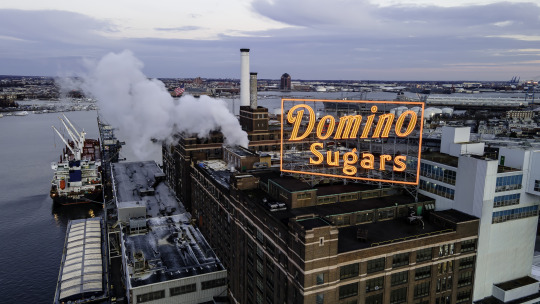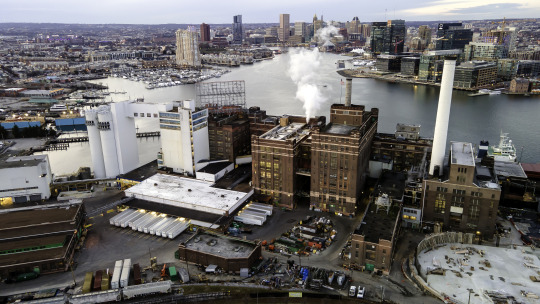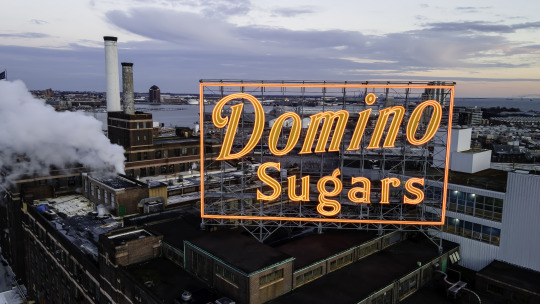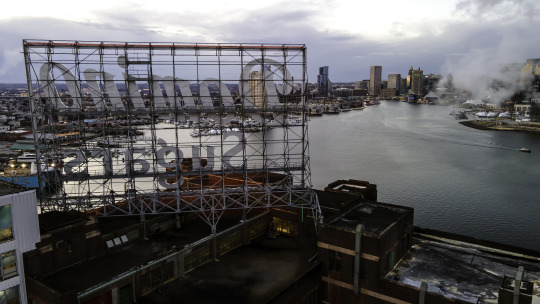#domino sugars
Text





Domino Sugars
Key Highway, Locust Point, Baltimore, Md
#baltimore#maryland#baltimore md#baltimore maryland#charm city#best of baltimore#bmore#domino sugar#domino sugars#neon sign#dji#drone photography
91 notes
·
View notes
Text

From a recent walk home on a Friday night, as the Domino Sugars sign was looking extra-lovely.
(Fun fact: this is still a real sugar refinery! There was a fire in one of the storage sheds a few years ago, and the air smelled of crème brûlée for a good long time.)
#baltimore#south baltimore#riverside#domino sugar#domino sugars#domino sugar sign#former neon sign#now an LED sign#vintage neon
7 notes
·
View notes
Video
Fort McHenry - Baltimore, Maryland. by Kevin B. Moore
#baltimore#baltimore museum of industry#bmi#domino sugars#fort mchenry#history#maryland#museum#urban#brick#masonry#fort#mchenry#light#dark#war#1812#battle#baltimoreharbor#low light#flickr
3 notes
·
View notes
Text

The Amstar Corporation, 1975
#Domino Sugar#ad#1975#Christmas cookies#advertisement#vintage#1970s#holiday baking#cookie recipe#advertising
199 notes
·
View notes
Text

1953 Domino Cane Sugar
#1953#domino#sugar#cane#sweet#foods#calories#fat#cerealkiller#vintage food#food#vintage advertising#vintage magazine#kitchen#magazine#1950s#50s#50s ads
29 notes
·
View notes
Text







ଘ(੭*ˊᵕˋ)੭* ੈ♡‧₊˚
#💙 sugar life posting 🌙#gamercore#stimblr#stimming#stimmy#stim#Super Mario#Princess Peach#Luigi#Donkey Kong#Toad#Bowser#gifsets#gifs#Nintendo#dominos#kidcore#red#orange#yellow#pink#blue#white#green#brown#toys#toycore#toyblr
53 notes
·
View notes
Text

Baltimore 🧡🧡🧡🧡
11 notes
·
View notes
Text
i didn’t post about it here yesterday but i made masala with a whole bunch of stuff in it (chickpea paneer AND tofu) (because i’m the boss and i get to do what i want) and it came out only ok (too much coriander, really old garam masala, weird taste) (edible but not ideal) and i just ate it as stew yesterday but today i made myself make basmati and eat it again as leftovers instead of ordering pizza. everybody clap
#did that thing where when you taste one little spoonful it doesn’t taste like much so you keep putting in spices and then when you eat#a whole bowl you’re like ‘oh wow…’#except it was mostly the coriander. and i put in too much clove also i think#i had to put in a bunch of sugar to make it less crazy. and lime juice#anyway i’m glad i made myself eat leftovers 👍#but i might order pizza tomorrow bc i have a free one from dominos 😈 and it’s wrasslin tomorrow#chatpost#REALLY wish i had chutney. ive never made chutney what goes in it it’s just like onions with sauce or something#i bet it’s easy to make but i wonder where i can get some. maybe i should go to the indian market tomorrow after work
11 notes
·
View notes
Text
shockingly, it does turn out that eating things that make you sick and fucking up your sleeping schedule and not getting any exercise for a month will trigger a little depression
#i think yesterday was my limit but i'll be fine once i manage to drag myself out of the house#and go back to strictly no dairy or sugar#ughh#i think it's mostly bc it's got cold that makes me want to eat sweet things which causes the domino effect#ugh ugh ugh
14 notes
·
View notes
Photo










Alex G
Paradise Rock Club, Boston, MA
8 November 2022
click for coverage
21 notes
·
View notes
Text

3 notes
·
View notes
Text

Tall ship delivering sugar to domino sugar in Baltimore
20 notes
·
View notes
Text
Seto Kaiba does not go to Starbucks. It's for peasants. Instead, he obviously has his own coffee machine, both at home and his office's kitchenette, which roasts, grinds and brews the special recipe that he meticulously selected with the best ingredients in the world:
-Crushed green cardamom seeds from Ceylon mixed with ground cinnamon sticks from Saigon and coarse ground arabica coffee beans (medium roast) from Ethiopia.
-Brew the mixture in a percolator.
-Extract, pour, add a couple of star anises and sprinkle with cocoa powder as a final touch.
#mokuba was about to puke once#i believe Seto's brain damage might have something to do with all this#like his sense of taste might be all over the place#when he feels bold enough he might switch the cocoa powder with a hint of black pepper#he's very jealous of this recipe#he probably also owns an espresso machine#for those really bad days you know#when he just chokes down black coffee all day#other times he really just doesn't care and he brews the most bland simple coffee ever#and adds two bags of sugar#when he has meetings in his office he likes to show off his special blend#but everyone is too polite/scared to tell him they are really not fans of it#it's alright mr. kaiba I'll have an espresso#no#drink this#he's such a diva#i love him and i hate him#domino blues#seto kaiba
5 notes
·
View notes
Text
WASHINGTON — The Biden administration announced Wednesday that it would block shipments of sugar from Central Romana Corporation, a Dominican Republic company that produces sugar sold in the United States under the Domino brand and that has long faced allegations of subjecting its workers to poor labor conditions.
U.S. Customs and Border Protection issued what is known as a withhold release order against the company “based on information that reasonably indicates the use of forced labor in its operations,” including abusive working and living conditions, excessive overtime, withheld wages and other violations.
“Manufacturers like Central Romana, who fail to abide by our laws, will face consequences as we root out these inhumane practices from U.S. supply chains,” AnnMarie R. Highsmith, the executive assistant commissioner of the agency’s Office of Trade, said in a statement.
Central Romana responded that it was “very disappointed” by the decision and that it had been investing significantly for years to improve the living conditions of its employees.
“We disagree vehemently with the decision as we do not believe it reflects the facts about our company and the treatment of our employees,” it said in a statement on Wednesday.
Central Romana, which is the largest landholder and employer in the Dominican Republic, exports more than 200 million pounds of sugar to the United States each year. It is owned partly by the Fanjul family, an influential force in U.S. politics for decades as key donors to both Republicans and Democrats.
The measures have been the subject of an intense debate on Capitol Hill, where profits from the sugar industry are funneled into generous campaign contributions and lobbying expenditures, according to people familiar with the discussions who spoke on the condition of anonymity.
The United States is the most important market for Dominican sugar, and the move could have a crippling effect on Central Romana, which alone produces roughly 59 percent of the Dominican Republic’s sugar, according to the U.S. Department of Agriculture.
It could also cause significant disruptions to U.S. sugar imports in the near term, though economists said the impact on sugar prices, which are heavily influenced by regulation, remained to be seen. Those regulations include price supports that keep U.S. sugar prices far above those on world markets, as well as preferential tariff rates for sugar imported from the Dominican Republic.
Charity Ryerson, the executive director at Corporate Accountability Lab, a Chicago-based human rights organization, said the restrictions would be a powerful impetus for Central Romana to improve conditions for its workers.
“Central Romana has been on notice for years but has failed to comply with even the most basic of labor and human rights standards in their operation,” she said. “From this moment forward, we have a really significant opportunity for C.B.P., for Central Romana and civil society to work together to ensure that workers are free, they’re treated fairly and that forced labor never happens on these farms again.”
The Dominican sugar industry has been the subject of scrutiny for decades for its poor labor practices. Media reports and human rights groups have said Central Romana exerts tremendous power over its workers, many of whom are Haitian migrants and some of whom lack citizenship.
Many workers live in dilapidated housing without running water and electricity, according to civil society groups. The company has also been accused of forcibly evicting families from their homes in the Dominican Republic, and employing a force of masked and armed guards that intimidate workers.
Central Romana has publicly defended its practices and has said it offers among the best working conditions in the industry. A congressional delegation that visited the Dominican Republic and met with workers this summer said the country had made progress toward addressing some of the worst abuses, including child labor and human trafficking.
But the delegation still found evidence that forced labor was persisting on the sugar cane farms. Sugar cane cutters faced “arduous working and living conditions” and “a culture of fear appears to permeate the industry,” Representatives Earl Blumenauer of Oregon and Dan Kildee of Michigan, both Democrats, said in a statement.
Members of the Fanjul family, Cuban exiles who started sugar cane farms in Florida and acquired the Dominican Republic company in the 1980s, have been a powerful force in American politics for decades, known for relationships with the Bush family, the Clintons and Senator Marco Rubio, Republican of Florida, among others.
They are part owners of American Sugar Refining, the world’s largest sugar refinery, which processes sugar from the Dominican Republic at its U.S. facilities and sells to companies including Hershey.
#U.S. Blocks Dominican Republic Sugar Imports#Citing Forced Labor#slavery in 2022#dominican republic slavery in 2022#dominican republic#west indies#sugar#domino#domino sugar
3 notes
·
View notes
Photo

American Sugar Refining Co, 1955
#Domino#ad#1955#mid-century#sugar#advertisement#illustration#energy lift#pure cane#vintage#midcentury#1950s#art#less fattening#marketing#reducing#booklet#sugars#refined#granulated#advertising#mid century
256 notes
·
View notes

